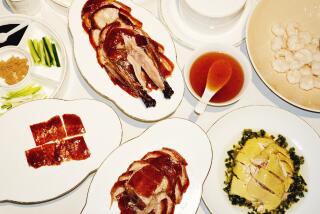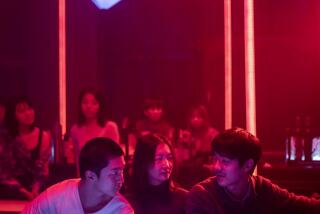Great Read: A restaurateur who’s an artist outside the kitchen
The guests have hung their coats by the indoor swimming pool of a 23rd-floor penthouse overlooking Beijing’s iconic Bird’s Nest stadium. In the apartment’s soaring atrium, designed like a traditional courtyard home, a chef carves roast duck alongside banquet tables stacked with sushi, lobster and Chinese cuisine.
Koi swish silently in a pond, beneath a tree illuminated with tasteful uplights. From a balcony perched above the indoor garden, Chinese melodies waft from a group of female musicians.
As he takes the floor to speak, the man of the hour, L.A.-based restaurateur-to-the-stars Michael Chow, seems both at home amid his host’s posh surroundings and on unfamiliar ground.
The dapper man with the natty suits and trademark owl spectacles is recognized from Malibu to Miami for his eponymous “Mr. Chow” Chinese eateries and known for his connections to artists such as Andy Warhol and Keith Haring. But Chow is not here to be feted for his high-profile (if critically snubbed) culinary empire or his sparkly celebrity clientele.
Instead, this native son of Shanghai is — at age 75 — seeking to reclaim several complex identities he says have eluded him, painfully, during more than 60 years of life in the West.
In China, “Mr. Chow” is known — if he’s known at all — as the son of Zhou Xinfang, a superstar of Peking opera who was savaged by Mao’s Red Guards. This night, with an exhibition of his own paintings and his family history opening in Beijing the next day, Chow is asserting himself not only as an artist in his own right, but also as an artistic heir of his famous father.
“I lost everything,” Chow says, recounting his struggle to prosper in the linguistically and culturally alien London where he was sent, alone, to study at age 12. As communist China sank into international isolation in the 1950s, then the terrors of the Cultural Revolution in the 1960s and ‘70s, Chow was cut off from his homeland and his family.
Chow never again saw or spoke to his father, learning only years later that he was politically persecuted and essentially beaten to death.
It is a complex and dark back story for Chow, an ebullient man whose given name, Yinghua, translates as “Chinese Hero.”
Chow — who has dabbled in acting, doing bit parts in films like “Rush Hour 3” — has clearly inherited some of his father’s theatricality. He name-drops as if it’s a competitive sport (“David Geffen was showing me this Pollock he had…”) and has no qualms about comparing himself to, say, Beethoven. He bounces nimbly and charmingly between self-aggrandizement and self-deprecation, veering occasionally into (not irrational) insecurity.
For years, Chow says, he has struggled to bring the two halves of his self — Western and Eastern, American pop culture personage and descendant of a traditional Chinese culture icon — into closer proximity, let alone unity.
“People think they know me,” Chow recalls over breakfast in a Beijing hotel. “They don’t really know me. They only know part of me.”
::
Days before “Michael Chow: Voice for My Father” opens at the Ullens Center for Contemporary Art in Beijing’s 798 arts district, Chow is narrating a personal tour of the show.
In the first gallery, viewers encounter Chow’s giant, abstract collages, created since 2012 in his West L.A. studio, at the encouragement of friends including Jeffrey Deitch, former director of the Museum of Contemporary Art.
Another room features a number of portraits of Chow made by artists including Haring, Warhol, Ed Ruscha and Jean-Michel Basquiat, mostly in the 1980s. Alongside those are dozens of historical photos from his father’s long career, many showing him in elaborate robes and long, dramatic beards.
Southern California is home, explains Chow, who lives in Holmby Hills. “My friends, my peers, my whole thing is in L.A. But if I say to them, I’m going to China, they’re celebrating my father’s 120th birthday, they say, ‘Have a nice time.’
“I say my father is Zhou Xinfang; he is William Shakespeare, he is Superman and Spider-Man all in one. They say, ‘OK, can you pass me the salt?’” says Chow, his braggadocio leavened with sadness.
In China, his Western-hemisphere biography has often been met with similar shrugs. “The Chinese here, they don’t know about me, they don’t care about me. If I stand up right now and say, I’m very patriotic, I love China, I brought China to the West [through my restaurants], they’ll say, sit the bleep down!” he says, arching an eyebrow theatrically and chuckling heartily.
But now, he says, the time is ripe for some sort of convergence, a filling of the void. “Finally, at this moment, it all comes to a head,” he says. “This is like a completion.”
::
For those unfamiliar with the history of Peking opera, drawing a direct artistic line from father to son can be difficult. Zhou Xinfang was a prodigy known as the Unicorn Child who helped modernize the form over many decades.
Chow recalls his father externally as a “very modest” person who “never carried money, was a little foolish and stupid in life, but onstage, he became dynamic.”
“But internally,” says Chow — who has also dabbled in architecture — “my creative side is completely guided by him. So much confidence and strength comes from him and his performances.”
He’s aware that in L.A., his canvasses may be derided as the vain creations of a man who thinks he can paint just because he’s rich or had some famous artist friends.
But such criticism, supporters say, neglects not only his artistic patrimony, but also his early training in London art schools, his painting exhibitions in the late ‘50s and early ‘60s and his myriad creative endeavors in the subsequent decades.
“People don’t realize Michael trained as an artist — that’s his whole formation. When he left Shanghai, he went to Saint Martin’s in London and was in a number of shows and things and had a burgeoning art career before any of the restaurants or anything,” says Philip Tinari, curator of the Beijing show, which will later travel to the Andy Warhol Museum in Pittsburgh. “So it’s a much bigger arc of him returning to art and making paintings.”
Chow’s work, says Tinari, is interesting on its own, but what really captured his imagination is “the larger story of this man and his life as a story of Chinese cosmopolitanism in the 20th and 21st century.”
From a distance, Chow’s works can appear like landscapes. Up close, the massive collages are stuffed to the edges, some with morbid flourishes like burned gloves and hair-like material, as if Chow were trying to cram all his experiences — or maybe pain — onto the surface.
Springing from canvas to canvas with a childlike exuberance, he describes his techniques (burning, stapling, splattering) and materials (eggs, sponges, $2 bills, 24-karat gold, tree leaves, wallpaper). He peppers his commentary with culinary terms, perhaps unavoidable for a man who’s spent nearly five decades in restaurants since opening his first venue in Knightsbridge, London, in 1968.
“I marinated the silver,” he says, explaining that he wants to “cook” his artistic ingredients in such a way that the individual components are not immediately identifiable.
He tosses in sound effects, as if he were a comic-book character who has suddenly leapt off the page. “When I burn, I go Pt-choooo, like this, with a torch!” he says, gesturing to one part of the artwork. Pointing at another splotch, he explains, “This here is accidental, it went taaaack! Chi-chi-chi.”
::
Chow almost never seems at a loss for words, or some onomatopoeia, except when the subject turns to his family’s suffering. “After 1952, I never saw my father again, never communicated with him again, even his death I didn’t know,” he says flatly. “Then there’s the whole — let’s not get into that — Cultural Revolution thing, which we don’t touch.”
Looking too closely at that era seems too painful and perhaps too selfish for Chow. Zhou was hardly alone in his suffering; many other artists were purged and attacked.
“China, the Chinese people, in the 20th century, went through a lot. Not just me — 1.4 billion people.... Everyone has a story. Some far worse, some far better. But there’s always a positive side,” Chow says quietly.
These days, with China growing more wealthy and developed, he says, “I accept it as one shouldn’t touch it, because we are at a very positive stage now, and China can deal with it later.”
Still, he did make one nod to his family’s travails. In the English-language (but not Chinese) version of the exhibition catalog, Chow has included a 118-page screenplay for a film titled “Voice for My Father: A True Story,” a script he says he worked on for 10 years.
Chow is now just five years younger than when his father died, after a final assault in 1975. Although he says it is hard for him to identify with father’s final years, he relates to his struggle, and how hurt can be a fuel for artistic expression.
“If the human being is lucky enough to express himself through a medium, in my case painting, it’s fantastic,” Chow says, his eyes growing moist. “It’s a very lucky thing.”
More to Read
Start your day right
Sign up for Essential California for news, features and recommendations from the L.A. Times and beyond in your inbox six days a week.
You may occasionally receive promotional content from the Los Angeles Times.







